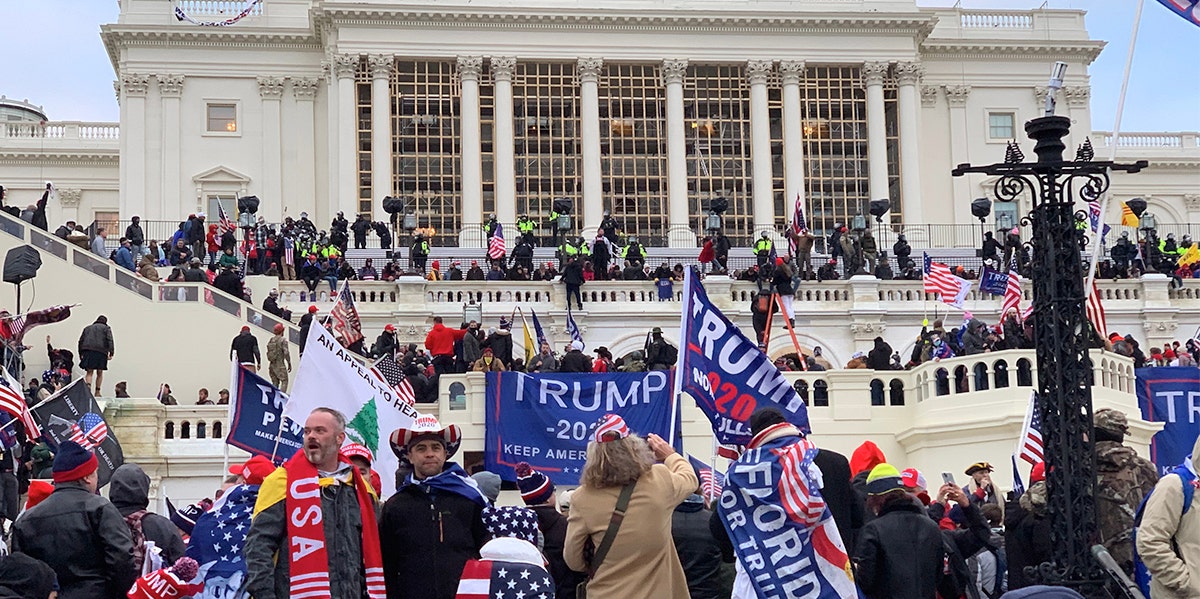No Protestor Deserves To Be Shot By Law Enforcement. Period.
Police work should mean more than solving problems with bullets.
 Sebastian Portillo / Shutterstock
Sebastian Portillo / Shutterstock Five dead, many more injured, and a nation in turmoil. America needs to do better than fighting fire with fire.
President-elect Joe Biden called the Jan. 6 riots at the Capitol building “one of the darkest days” in American history, and it’s impossible to disagree.
The country and the Capitol has been torn apart by rampant thugs and a President who is trying to destroy democracy.
The sheer pointlessness of the riots makes it a reality all the more difficult to bear. An election has been fairly won, the Senate has been righteously taken by the Democrats. Lives have been lost for no reason.
However, no protestor deserves to be shot by law enforcement.
It is a tale all too familiar to many Americans, and it needs to stop.
In homes, on street corners, in playgrounds, and at routine traffic stops, countless lives have been needlessly lost thanks to poor police work.
Ashli Babbitt, a 35-year-old California native, was the only casualty at the hands of the law enforcement during the riots. Three other deaths were caused by heart attacks. Babbitt, an Air Force veteran, was also an avid Trump supporter and QAnon supporter.
By storming the Capitol she was absolutely dangerous, and possibly a threat to domestic safety. She deserved to be arrested and imprisoned. But did she deserve to die? Does anybody deserve to die?
Time and time again we have seen headlines attempting to justify the killing of Black men and women by spreading information that they were armed, dangerous, or out-of-control, and police had "no choice" but to shoot, tase, or kneel on necks.
But there is no justification for shooting Michael Brown in broad daylight with his hands up, just the same as there is no justification for shooting Ashli Babbitt inside the Capitol.
Law enforcement work should be preventative, not reactive. The events of Jan. 6 should never have escalated to the point where law enforcement opened fire on civilians, just like police on Staten Island on July 17, 2014 should have been able to diffuse the situation before ever putting Eric Garner in a prohibited chokehold.
There is no scale that quantifies how tragic someone’s death is. There is no measurement that makes a death justifiable.
To sympathize with Babbitt’s death does not mean you have to agree with her actions. In fact, acknowledging that she should never have gone to the Capitol in the first place is part of acknowledging that her death was unnecessary.
If police funding was better directed into healthcare, education, and mental health services, maybe we wouldn’t even have the kind of divisions and misinformation in our country that cause Americans to make attacks on democracy.
The double-standard between the Capitol riots and Black Lives Matter protests are painfully visible.
While peaceful protestors objecting to the killing of Black people were met with tear-gas and rubber bullets, pro-Trump domestic terrorists attempting to subvert democracy were largely ignored by police until they stormed the Capitol.
Across social media, people have been justifiably frustrated by police response. Where were the mass arrests and National Guard? The mace and the tasers?
But these questions aren’t meant to imply that these protestors should have been shot at and tear-gassed.
Such a statement would regress the important conversations we’ve been having about police reform and white privilege over the past year.
Instead, the purpose of these questions is to call out exactly why police force is unfairly applied across racial groups. Capitol police and law enforcement in the area turned down support from the National Guard and FBI as the mob was approaching.
These police officers clearly felt confident they could handle the protests without excessive force. So why didn’t the police have the same view back in summer 2020 during the BLM demonstrations?
And yet, despite their prejudicial assumption that they could handle white protestors without reinforcements, the shortcomings in police training were as evident in Ferguson, Minneapolis, Birmingham, and across America during BLM protests as they were in Washington D.C. during these riots.
Caught up in the frustration and shock at the inequality of these two opposing protests, it is easy to forget the mission at the heart of the BLM movement: to end the police violence and brutality that disproportionately affects Black people.
The purpose of the BLM movement is not to redirect this violence, but to eradicate it entirely through improved police training and a better allocation of funds.
To honor and support this movement requires a constant interrogation of poor policing, even if the victims of that poor policing do not share your political or social views.
To attempt to justify the killing of a protestor, no matter what side they’re on, by law enforcement is to neglect the fact that a system that encourages law enforcement to shoot civilians dead shouldn’t exist in the first place.
Ashli Babbitt should not have been in the Capitol. She should not have been inciting violence online. She shouldn’t have supported a President that would encourage domestic terrorism.
But does this mean she deserved to die?
Alice Kelly is a writer living in New York City. She covers pop culture, social justice issues, and trending topics.

